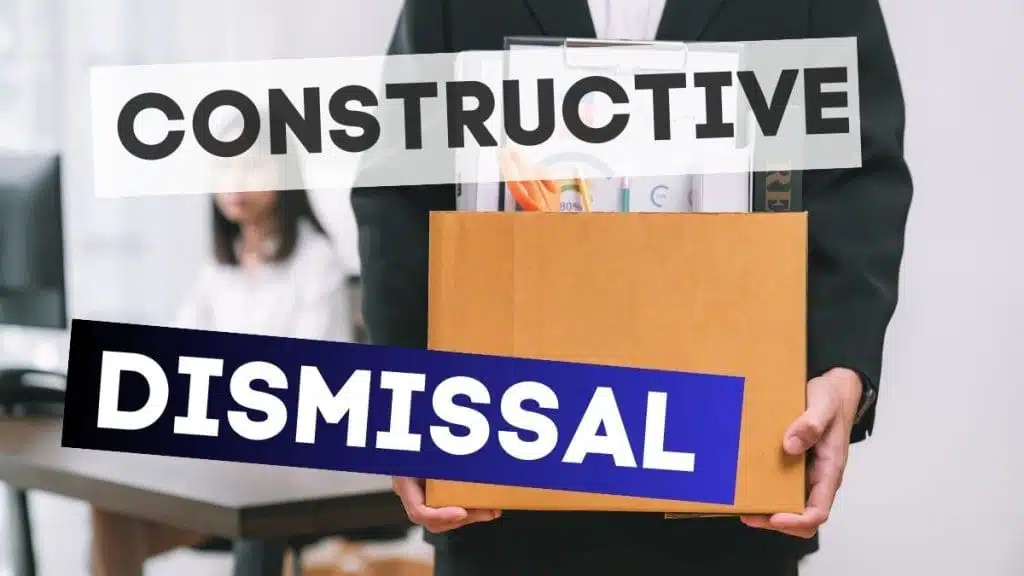Constructive Dismissal Settlement Agreement Solicitors
At Solidaire Solicitors, we understand that employment relationships can sometimes break down, leaving employees feeling trapped in a toxic work environment. If an employer’s behaviour forces an employee to resign, this may amount to what is known as constructive dismissal.
What is Constructive Dismissal?

Constructive dismissal occurs when an employee is forced to resign due to their employer’s serious breach of contract. Unlike unfair dismissal, where the employer terminates the employment, constructive dismissal places the onus on the employee to prove that the resignation was justified by the employer’s conduct.
For a constructive dismissal claim to be valid, an employee must demonstrate:
- A serious breach of contract by the employer.
- The employee resigned as a direct result of the breach.
- The resignation was without undue delay.
Contact Us Today!
Please fill in the form and we will get back to you within 24 hours.
What Constitutes a Serious Breach of Contract?
A serious breach of contract can take various forms, including but not limited to:
- Non-payment of wages or persistent late payments.
- Bullying, harassment, or discrimination by colleagues or management.
- Unjustified demotion or significant changes to job duties without consultation.
- Failure to provide a safe working environment.
- Unreasonable disciplinary actions or micromanagement.
It is crucial to note that the breach must be significant enough to undermine the foundation of the employment relationship.
Employee Rights in a Constructive Dismissal Claim
Employees who believe they have been constructively dismissed may bring a claim before an Employment Tribunal. However, certain criteria must be met:
- Length of service: The employee must have at least two years of continuous service with the employer, except in cases involving discrimination or other statutory breaches where no minimum service is required.
- Resignation letter: It is highly advisable to clearly state in your resignation letter that you are resigning due to the employer’s breach of contract.
- Time limits: A claim must be filed within three months minus one day from the date of resignation.
Challenges in Proving Constructive Dismissal
Proving constructive dismissal can be challenging as the burden of proof lies with the employee. Key challenges include:
- Establishing that a breach occurred: It is essential to provide evidence of the breach, such as emails, witness statements, or documented incidents.
- Demonstrating causation: The employee must prove that the resignation was a direct result of the employer’s breach.
- Acting promptly: A delay in resigning after the breach may weaken the claim.
How Solidaire Solicitors Can Help
At Solidaire Solicitors, we offer expert legal advice and representation to employees considering a constructive dismissal claim. Our services include:
- Initial consultation: We will assess your case and provide clear advice on the likelihood of success.
- Document review: Our team will review employment contracts, resignation letters, and any supporting evidence.
- Representation: We offer full representation at Employment Tribunals, ensuring that your case is presented effectively.
Our experienced employment law solicitors are committed to securing the best possible outcome for you. We understand the emotional toll that a toxic workplace can take, and we will support you every step of the way.
Get a Free Settlement Estimate – See What You Could Be Owed
Frequently Asked Questions
In most cases, you need two years of continuous service to bring a constructive dismissal claim. However, exceptions apply in cases involving discrimination or breaches of statutory rights, where no minimum service is required.
Compensation for constructive dismissal includes basic award and compensatory award. The basic award is calculated based on your age, length of service, and weekly pay, while the compensatory award considers your financial losses resulting from the dismissal.
Your resignation letter should clearly state that you are resigning due to the employer’s serious breach of contract. Be specific about the incidents that led to your decision and keep a copy for your records.
Get in Touch!
Please fill in the form and we will get back to you within 24 hours.
EXCELLENT



